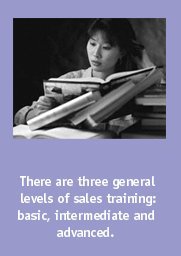
Are You Ready For It?
| Ïðîäàæè | ||||
| Sales.com | ||||
| Answers... | ||||
by Hal Slater
 In
previous articles, we examined the change that has taken place in face–to–face
selling that has pretty much ruled out anything but high–ticket sales.
Today's high–ticket products require skilled professionals who are knowledgeable
about their products and serious about their performance. Their training
requirements are different and continuously repeating "the basics" is
counter–productive in terms of job satisfaction and morale. The purpose
of this article is to explain the sales training continuum and help salespeople
and their managers arrange for training appropriate to their skill level.
In
previous articles, we examined the change that has taken place in face–to–face
selling that has pretty much ruled out anything but high–ticket sales.
Today's high–ticket products require skilled professionals who are knowledgeable
about their products and serious about their performance. Their training
requirements are different and continuously repeating "the basics" is
counter–productive in terms of job satisfaction and morale. The purpose
of this article is to explain the sales training continuum and help salespeople
and their managers arrange for training appropriate to their skill level.
First, there are three general levels of sales training: basic, intermediate and advanced. Each corresponds to a different phase of experience and performance level. Beginners, salespeople with virtually no experience selling in the target environment, need to learn essential skills such as: time management, self–motivation, dealing with rejection, product applications and capabilities, fundamental selling skills, paperwork completion, contact management. Most of this training is done within the first days or weeks of being hired. Some companies train new hires before sending them into the field, some train while they are selling part–time, both systems can be made to work depending upon product and marketing approach. In quantitative terms, beginners in need of basic training, are usually in the lower 30 percent of your force. Many firms successfully outsource this training since, at any given time, only a few people should be in this category.
Once basic performance parameters have been explained, the student using this knowledge, the salesperson is ready to enter the intermediate level of training. Intermediate Sales Training is coaching conducted under the tutelage of an experienced performer with a vested interest in the student's success. This is the phase where the student's behaviors become habits. This is where knowledge goes from hearing about to doing. A good coach stays on the sidelines during sales calls, observing and listening preparing to provide direction between calls. This is the domain of the front line manager. In terms of importance to the business, no single employee has more impact than the front–line sales manager. This person establishes the very behaviors the companies' survival depend upon. That is why coaching intermediates is the most valuable use of a manager's time. Intermediate performers need specifics, not basics, not theory. They want to know, "how to" and they often need to be shown. Good coaches will occasionally take a call for the salesperson to observe, generally observing, never both.
Advanced sales training is training that helps the experienced salesperson understand and execute their skills better. Advanced training is rarely "breakthrough." Instead, it is based upon the concept of constant and continuous improvement. As noted earlier, it rarely contradicts the successful sellers approach, no matter what that is. Advanced training helps the salesperson understand why their approach works. Advanced material to train is difficult to find and harder to develop, but once found, it can make the difference between building a seasoned, informed, dependable force and week after week of interviewing and basic training while hoping sales meet expenses.